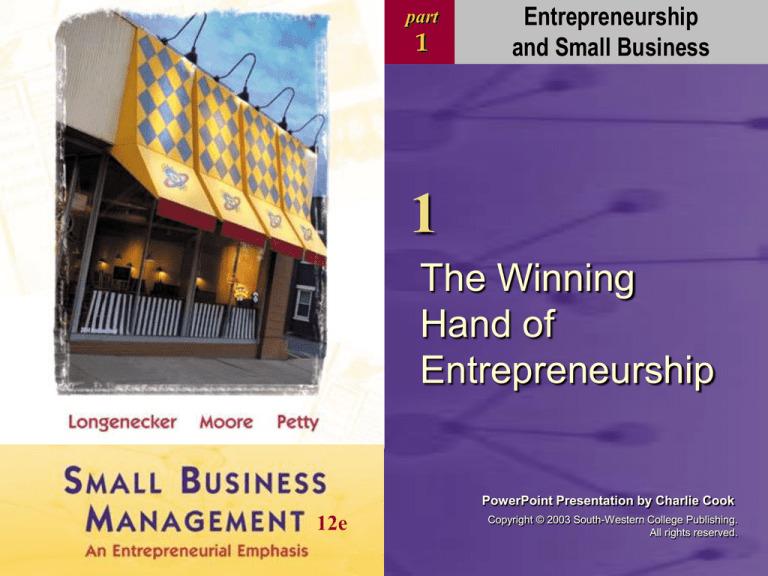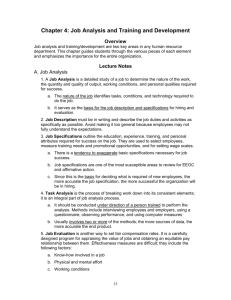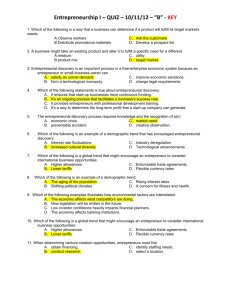
part
1
Entrepreneurship
and Small Business
1
The Winning
Hand of
Entrepreneurship
PowerPoint Presentation by Charlie Cook
12e
Copyright © 2003 South-Western College Publishing.
All rights reserved.
Looking Ahead
After studying this chapter, you should be able to:
1. Discuss the availability of entrepreneurial opportunities
and give examples of highly successful businesses
started by entrepreneurs.
2. Explain the entrepreneurial challenges presented by
e-commerce and global changes.
3. Explain the nature of entrepreneurship and how it is
related to small business.
4. Identify three motivators or rewards of entrepreneurial
careers.
Copyright © by South-Western College Publishing. All rights reserved.
1–2
Looking Ahead (cont’d)
5. Describe the various types of entrepreneurs and
entrepreneurial ventures.
6. Identify ways to gain a potential competitive edge for
small entrepreneurial firms.
7. Discuss factors related to readiness for
entrepreneurship and getting started in an
entrepreneurial career.
Copyright © by South-Western College Publishing. All rights reserved.
1–3
Entrepreneurial Opportunities
• Entrepreneurial Opportunity
–A value creating innovation with market potential
–A desirable and timely innovation that creates
value for interested buyers and end users.
• Success stories
–Marketplace Holdings
–Auntie Anne’s
–RotoZip® Tool Corporation
Copyright © by South-Western College Publishing. All rights reserved.
1–4
Who Are Entrepreneurs?
• Entrepreneurs are:
–Persons who starts and/or operates a business.
–Individuals who discover market needs and launch
new firms to meet those needs.
–Risk takers who provide an impetus for change,
innovation, and progress.
–All active owner-managers (founders and/or
managers of small businesses).
Copyright © by South-Western College Publishing. All rights reserved.
1–5
Entrepreneurial Challenges
• E-Commerce
–An outgrowth and part of the Information Age that
is producing the new economy.
• Globalization
–The trend toward a global
economy creates new
competition and opportunities.
Copyright © by South-Western College Publishing. All rights reserved.
1–6
What Is a Small Business?
• Criteria for Defining Smallness in Business
–Financing supplied by one person or small group
–Localized business operations (except marketing)
–Business’ size small relative to larger competitors
–Fewer than 100 employees
Copyright © by South-Western College Publishing. All rights reserved.
1–7
Entrepreneurial Incentives
Rewards of Entrepreneurship
Profit
Freedom from the limits
of standardized pay for
standardized work
Make
Money
Independence
Personal Fulfillment
Freedom from supervision
and rules of bureaucratic
organizations
Freedom to achieve a
satisfying way of life
Escape from an
oppressive culture
Escape from routine
and unchallenging work
Be Your
Own Boss
Enjoy a
Satisfying Life
Fig. 1.2
Copyright © by South-Western College Publishing. All rights reserved.
1–8
Entrepreneurial Refugees
• Foreign refugee
• Corporate refugee
• Parental refugee
• Feminist refugee
• Housewife refugee
• Society refugee
• Educational refugee
Copyright © by South-Western College Publishing. All rights reserved.
1–9
Varieties of Entrepreneurship
• Founder (“Pure” Entrepreneur)
–A person who brings a new firm into existence.
• Administrative Entrepreneur
–An entrepreneur who overseas the operations of a
ongoing business
• Franchisee
–An entrepreneur whose power is limited by the
contractual relationship with a franchising
organization.
• Entrepreneurial Team
–Two or more people who work together as
entrepreneurs.
Copyright © by South-Western College Publishing. All rights reserved.
1–10
Small Businesses, Growth, and Profits
• High-Potential Venture (Gazelle)
–A small firm that has great prospects for growth.
• Attractive Small Firm
–A small firm that provides
substantial profits to its owner.
• Microbusiness
–A small firm that provides
minimal profits to its owner.
Copyright © by South-Western College Publishing. All rights reserved.
1–11
Characteristics of
Artisan Entrepreneurs
• Technical training
• Paternalistic approach
• Reluctance to delegate
• Narrow view of strategy
• Personal sales effort
• Short planning horizon
• Simple record keeping
Copyright © by South-Western College Publishing. All rights reserved.
1–12
Characteristics of
Opportunistic Entrepreneurs
• Broad-based education
• Scientific approach to problems
• Willing to delegate
• Broad view of strategy
• Diversified marketing approach
• Longer planning horizon
• Sophisticated accounting
and financial control
Copyright © by South-Western College Publishing. All rights reserved.
1–13
Women Entrepreneurs
• More Women Entrepreneurs
–Women own 38% of all U.S. businesses.
–Employment at female-owned firms has grown
108% since 1992.
–Women are moving into nontraditional industries.
• Problems Facing Female Entrepreneurs
–Newness of entrepreneurial role
–Lack of access to credit
–Lack of personal networking
connections in the established
business community
Copyright © by South-Western College Publishing. All rights reserved.
1–14
Competitive Advantages of
Entrepreneurial Firms
• Customer Focus
–Lack of bureaucracy
• Quality Performance
–Quality is not limited
to large firms
• Integrity and
Responsibility
–A solid reputation
builds loyal customers
Copyright © by South-Western College Publishing. All rights reserved.
• Innovation
–Small firms are the
leading source of
innovation.
• Low-Cost Production
–Sound management
can lead to lower
operating costs.
1–15
Age Concerns in Starting a Business
Early Career Concerns
Late Career Concerns
1. Getting an education
1. Fulfilling family
responsibilities
2. Gaining work experience
2. Attaining seniority
in employment
3. Acquiring financial
resources
20
3. Earning investment in
a retirement program
25
35
45
Age
Fig 1.3
Copyright © by South-Western College Publishing. All rights reserved.
1–16
Characteristics of
Successful Entrepreneurs
• Strong commitment to the business
(tenacity)
• Strong internal locus of control
(self-reliant)
• Moderate risk takers
(financial, career, psychic risks)
Copyright © by South-Western College Publishing. All rights reserved.
1–17
Types of Entrepreneurial
Career Opportunities
Opportunity
Level of Risk
Starting a business
High risk
Buying a business
Medium risk
Opening a franchised business Medium risk
Entering a family business
Copyright © by South-Western College Publishing. All rights reserved.
Variable risk
1–18
Taking the Plunge
• Precipitating Event
–An event, such as losing
a job, that moves an
individual to become
an entrepreneur.
Copyright © by South-Western College Publishing. All rights reserved.
1–19







